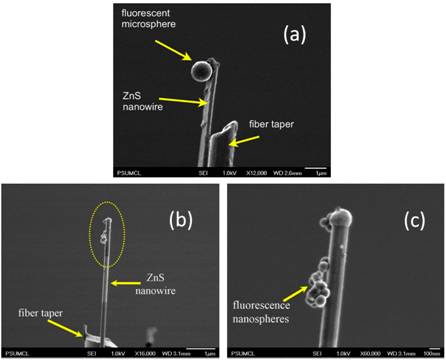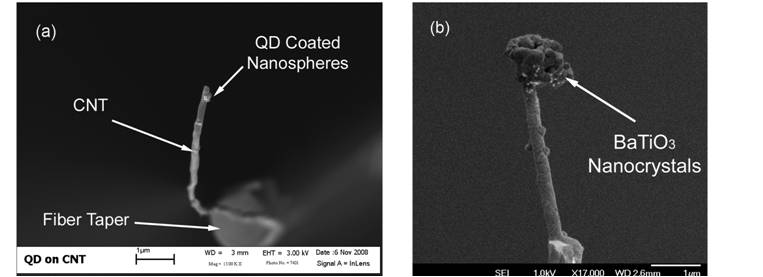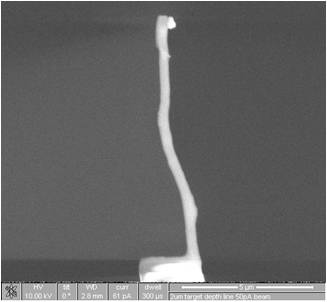The Ultrafast and Nonlinear Optics Lab at Penn State![]()
The Ultrafast and Nonlinear Optics Lab at Penn State![]()
Nano-Femto Optics
Characterizing the nearfield using nanoprobes
Subwavelength optical imaging can be accomplished by scanning a nanoscale aperture or a nanoprobe containing a locally defined nanoscale optical source. Currently, most such methods, including various implementations of near-field scanning optical microscopy (NSOM), form near-field images by measuring the intensity of optical signals generated by optical transmission, scattering or fluorescence. Here we report the development of a nanoprobe that can extend NSOM functionalities by focusing on the dynamical aspects of light emission (such as fluorescence lifetime measurement) and nonlinear optical processes (such as second harmonic generation). Our nanoprobes consist of a silica fiber taper, a single nanowire or a nanotube, and appropriate functional nano-optical structures. The fabrication, characterization and potential applications of such nanoprobes are discussed in [1].
Near-field scanning can achieve
nanoscale resolution while ultrashort pulse diagnostic tools can characterize
femtosecond pulses. Yet currently it is still challenging to nonperturbatively
characterize the near field of an ultrashort optical pulse with nanofemtoscale
spatiotemporal resolution. To address this challenge, we propose to develop a
nonlinear nanoprobe composed of a silica fiber taper, a nanowire, and nonlinear
fluorescent spheres. Using such a nanoprobe, we also report in [2] proof-of-principle
characterization of femtosecond optical pulse through interferometric
autocorrelation measurement.
Second Harmonic Nanoprobe (SHARP)
We have developed a second-order nonlinear nanoprobe for characterizing ultrafast optical near fields. The proposed nanoprobe comprises second harmonic nanocrystals attached to a carbon nanotube, which is in turn attached to a silica fiber taper. We demonstrate in situ pulse characterization directly in the air core of a photonic crystal fiber. Further, it is shown that nanoprobes containing a single nanocrystal in the tip of the nanotube can be fabricated by auxiliary focused ion beam nanomilling. These results (in [3]) indicate that the proposed nanoprobe can open an avenue for probing the evolution of ultrafast optical fields in complex three-dimensional micro- or nanostructures.



Figures above: Various constructions of nanoprobes.
References
[1] Y. Jia, H. Li, B. Zhang, X. Wei, Z. Zhang, Z. Liu, and Y. Xu, “Development of functional nanoprobes for optical near field characterization,” Journal of Physics: Condensed Matter 22, 334218 (2010).
[2] H. Li, Y. Jia, Q. Xu, K. Shi, J. Wu, P. C. Eklund, Y. Xu, and Z. Liu, “Development of a nonlinear nanoprobe for interferometric autocorrelation based characterization of ultrashort optical pulses,” Applied Physics Letters 96, 021103 (2010).
[3] H. Li, Z. Zhang, Q. Xu, K. Shi, Y. Jia, B. Zhang, Y. Xu, and Z. Liu, “Characterizing ultrashort optical pulses using second-order nonlinear nanoprobes,” Appl. Phys. Lett. 97, 261108 (2010).
Support
This work is supported by the National Science Foundation.
The Pennsylvania State University Department of Electrical Engineering